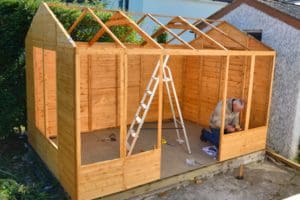Homeowners in Oregon have many good questions about what they can do with their property. One of the reasons people choose to buy a rural property or move to older neighborhoods with larger lots is because they want room for hobbies or work-from-home activities. Adding an external, free-standing building to your property can give you more room to use as a woodshop, craft room, “man cave” or “she shed,” or even simply storage. Before you build a shop in your backyard, there are several issues you need to consider that may impact your plans.
 Essential Considerations Before You Build a Shop on your Property:
Essential Considerations Before You Build a Shop on your Property:
- You may need a building permit. Oregon has very stringent requirements for building codes, and a permit is required in many situations. For example, if your building includes electrical, plumbing, or structural construction, you’ll need a permit for the work, which means you’ll need to have the work inspected by the city along the way.
- You might need a local zoning code approval for your project. If you’re constructing a new structure or if the shop will increase your home’s area or height, you may need a local zoning code approval. Another reason you might need this type of approval is if you’re changing the purpose of an existing structure, such as converting a barn to a shop.
- Location matters. Your property may be subject to setbacks or easements that restrict where a shop building can be located. A setback is a distance from the property line where no structure can be placed. An easement is an area that must be kept clear for public utilities or another city, state, or county use.
- Plan for future needs. You might not think having electrical or plumbing is vital for your shop now, but planning for it now may be easier and more cost-effective than adding it later. For example, don’t try to save a dime by not adding electrical to avoid a permit, and think that running extension cords from your home will be enough. If you’ll need electricity, it’s better to invest a few more dollars and do it correctly from the beginning.
- Pre-built sheds also have requirements. Just because you’re buying a pre-built shed doesn’t mean it is exempt from building codes and permit requirements. You may still be responsible for the same rules as a custom-built shed, depending on how the “pre-built” is installed, the type of foundation it will have, and if it will have electrical or plumbing running to it.
Richard Stevens & Associates can help you figure out all the requirements for your project.
Figuring out all the rules that apply to construction on your property is challenging, but Richard Stevens & Associates is here to help you out. We’re the professionals to help guide you through all land use issues to ensure you have the proper permits and approvals in place before you start investing money in a project. We assist our clients with all work related to rural and urban land use planning permits and zoning laws. Our team will work to understand your needs and help you understand the legal requirements to achieve your goals.

 Essential Considerations Before You Build a Shop on your Property:
Essential Considerations Before You Build a Shop on your Property: